Nothing to do with the Darwin Awards thankfully, as last weekend we had a double-dose of Charles Darwin.
The Wider Earth
On Friday evening we went to the Natural History Museum to watch 'The Wider Earth'. Anyone who's been to the Natural History Museum knows it's a special building and it's always fun to visit. Unfortunately we had to use the side entrance, so I still haven't seen the refurbished entrance hall with its whale.
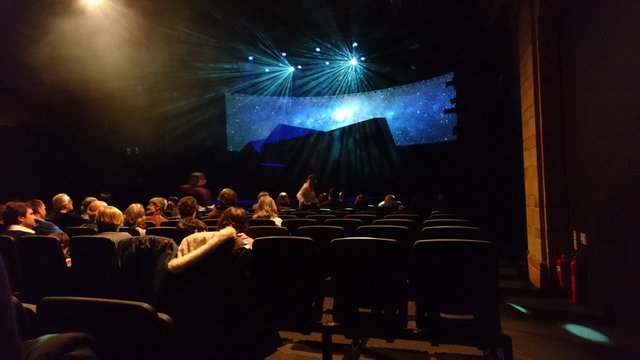 The Wider Earth: Settling in to our seats
The Wider Earth: Settling in to our seats'The Wider Earth' is a play describing Darwin's 5-year mission: to explore strange new worlds. To seek out new life and new civilizations. To boldly go where no man has gone before!
Darwin and the crew of The H.M.S. Beagle did see new life and new civilizations, and Darwin certainly explored some strange new islands where he found life never before encountered by Europeans. Of course, it was in his mind that Darwin went where few men had gone before.
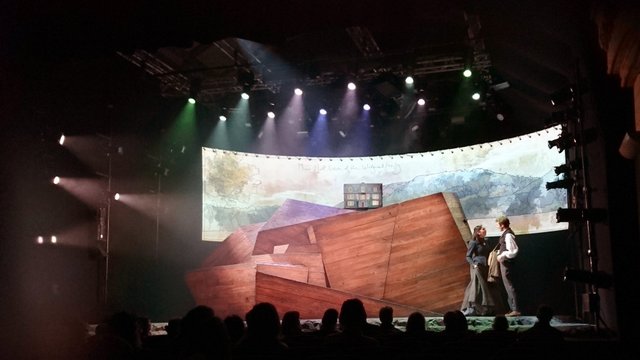 Emma Wedgwood and Charles Darwin discuss his imminent voyage
Emma Wedgwood and Charles Darwin discuss his imminent voyageThe play is produced by The Dead Puppets Society, an Australian company who studied for a while under Handspring Puppet Company ('War Horse'). The narrative is driven by the seven human actors/puppeteers and some well produced projections, while the puppets are used as illustration and context. The actors and puppets move around a revolving stage, with the rear projections showing the location and occasionally other bits of information. at times it reminded me of Peter Greenaway's mid-90s work with writing all over the place.
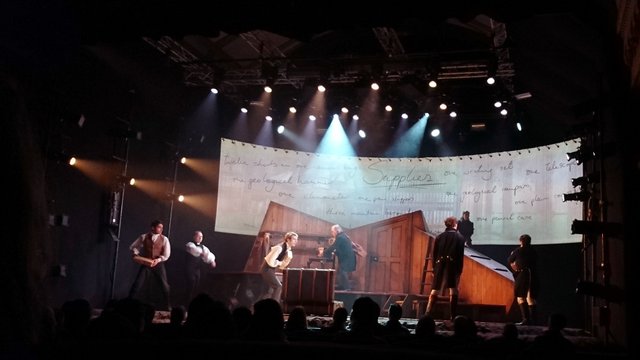 Supplies for a 2-year voyage. In the end, they were away for five years (British train companies still consider this level of delay acceptable).
Supplies for a 2-year voyage. In the end, they were away for five years (British train companies still consider this level of delay acceptable).Over a two-hour production (with interval) we travel from England to South America, Tierra Del Fuego, the Galapagos Islands and home again. Darwin's thought processes are well depicted; expressed as discussions and arguments with the priest and captain of the ship. The script is occasionally naive, but the incidents are drawn from fact, if not necessarily accurate to the moment. Early in the play Darwin picks up two beetles, and then finds a third. Lacking a spare hand, he pops one in his mouth!
The puppets are great - evoking the skeleton of the beasties they portray, there's a large amount of War Horse in their design and a small bit of Lion King in the birds and other flying things.
As a picture of what it was like to explore the world in Victorian times, this is an excellent production.
It runs to the end of February, and if you're travelling to London and planing to include the Natural History Museum, I'd heartily recommend it. However, make sure you buy tickets in the raised section. We were in row H and our view of the back projection was still blocked. People at the front would have barely seen the projections, but would have got to meet the puppets, so it's a question of priorities.
Down House
On Saturday, the weather was miserable so a re-think of how to spend the day led us to Downe in East London/Kent and Down House, where Darwin moved to not long after his return to England and lived until he died.
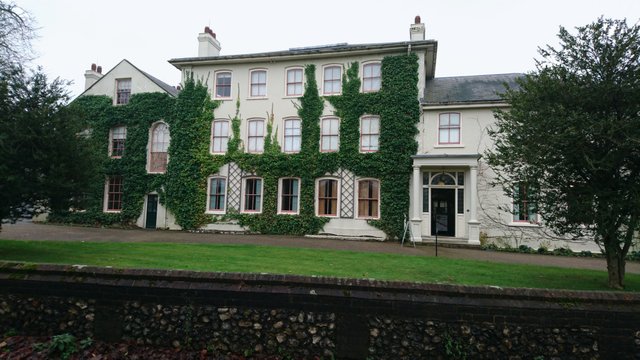 Down House
Down HouseThe house is on the outskirts of the Downe, and driving to the village it's hard to believe you're inside the M25. The road is narrow, with passing places and all very rural (M25 junction 4; A21; follow signs when they appear).
There's a couple of good pubs in Downe; we've now lunched at both and the beer and food is very good on a rainy day. There's also a canteen at Down House, it being an English Heritage property.
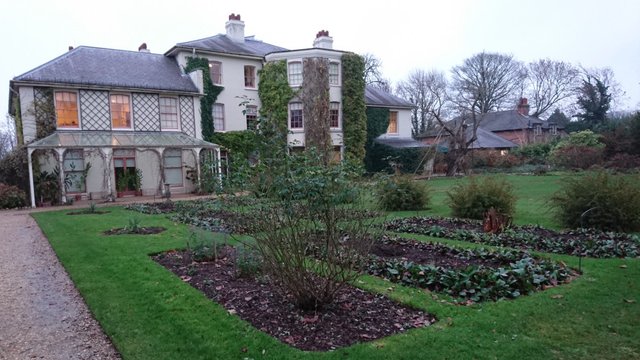 I want a back garden like this. Orchard and fields not shown.
I want a back garden like this. Orchard and fields not shown.Down House is big, boxy and has a garden that looks lived in. Even though it's not been a family home since the Darwins moved out, it still has that air. The upstairs is now a museum, while the downstairs is laid out as it was for the family, and you can take an audio tour of the house and gardens, narrated by David Attenborough and Andrew Marr.
The museum upstairs covers the voyage of the Beagle and Darwin's work on evolution, barnacles, earthworms and other matters of importance. Having seen the play, it was fascinating to see the real journals, books and finds we'd watched the night before. There's a room dedicated to the theory of natural selection. It took Darwin 20 years to summon up the courage to publish, as he knew the likely reception it would and did receive.
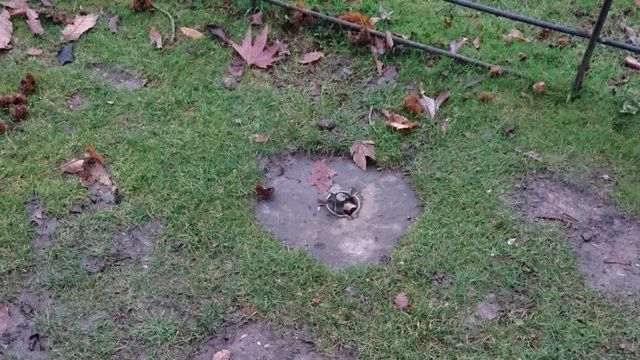 The Down House Wormstone. Darwin roped his family into his experiments. One of sons discovered that the worms removed a millimetre of earth a year.
The Down House Wormstone. Darwin roped his family into his experiments. One of sons discovered that the worms removed a millimetre of earth a year.Downstairs are the family rooms (the Darwins had twelve children) and Charles' study. It's small, but crammed with books, tools, pictures, and a bathtub (don't you have a bathtub in your office?). It's quite thrilling to see the man's mind reflected in a single room. Maps, a picture of HMS Beagle, portraits of the men who mentored and encouraged him jostle with books and cupboards to fill the walls.
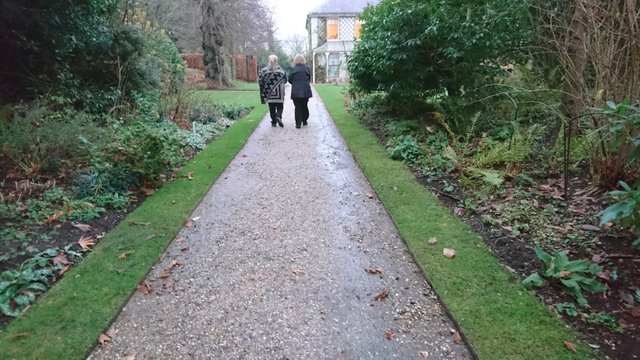 Walking the garden, as Charles did three times a day
Walking the garden, as Charles did three times a dayNo photos are permitted inside the house, but there's some on the web site. Even on a wet and windy November Saturday there were quite a few people, mostly tourists from overseas. I'd imagine that in summer the place would be packed. However, it's well worth a visit and we'll be going back in the spring or summer to get a good look at the gardens and greenhouse.
The play looks interesting. We went to Down House some years. Darwin is such a huge figure that we had to pay tribute.
Downvoting a post can decrease pending rewards and make it less visible. Common reasons:
Submit
One thing I got from the play, is that he knew very early on that he was on a collision course with religion, even though he considered himself a Christian. Which parallels Galileo (just read a very odd fictional account of his life), who was a good Catholic while promoting a world view which was considered heresy.
And, as for evolution, all I can say is: Ook!
Downvoting a post can decrease pending rewards and make it less visible. Common reasons:
Submit
Congratulations @hockney! You have completed the following achievement on the Steem blockchain and have been rewarded with new badge(s) :
Click here to view your Board of Honor
If you no longer want to receive notifications, reply to this comment with the word
STOPTo support your work, I also upvoted your post!
Downvoting a post can decrease pending rewards and make it less visible. Common reasons:
Submit